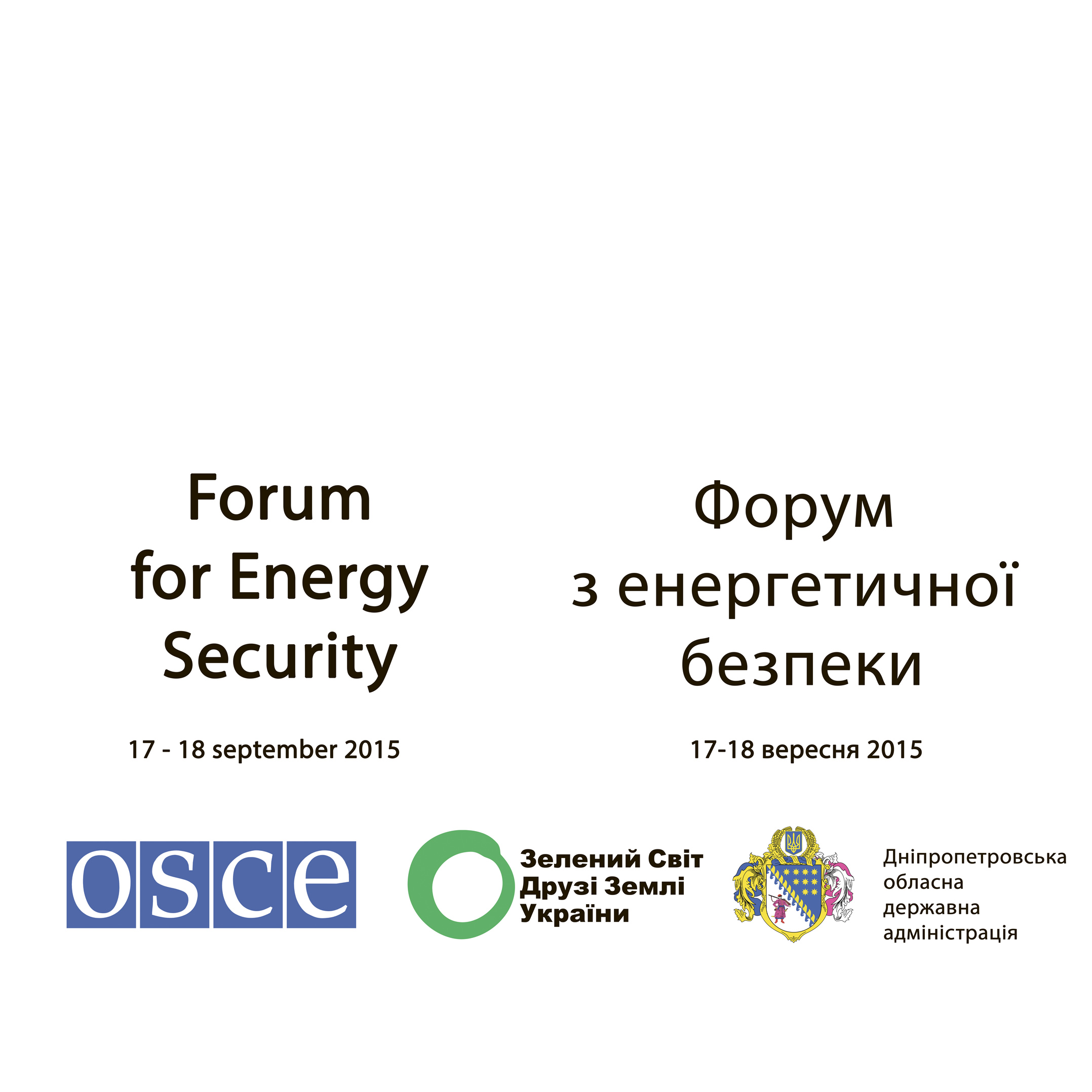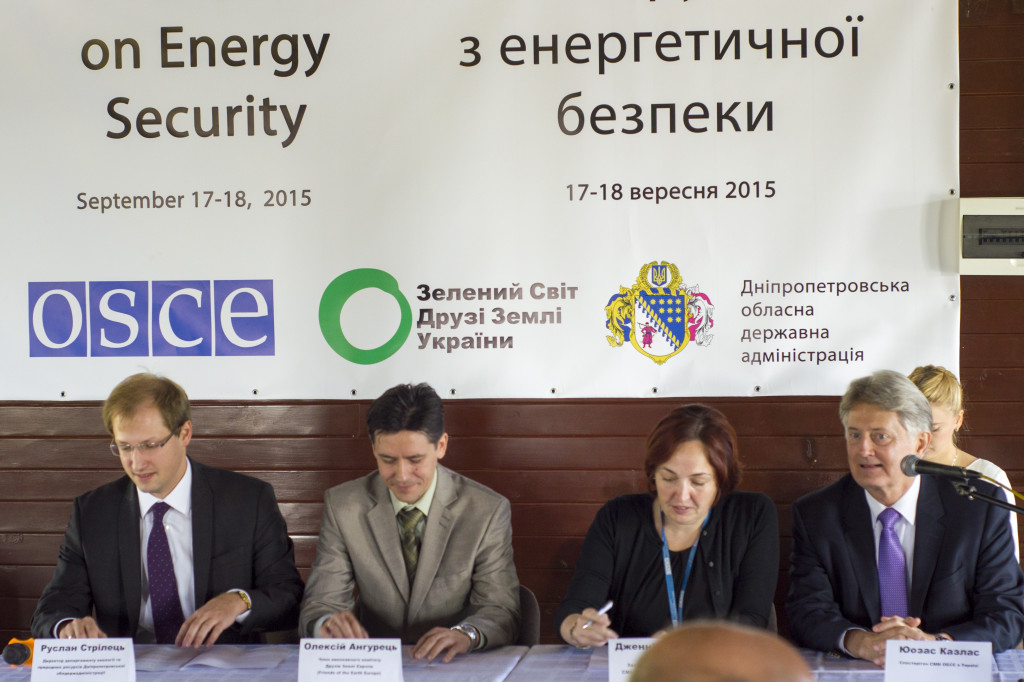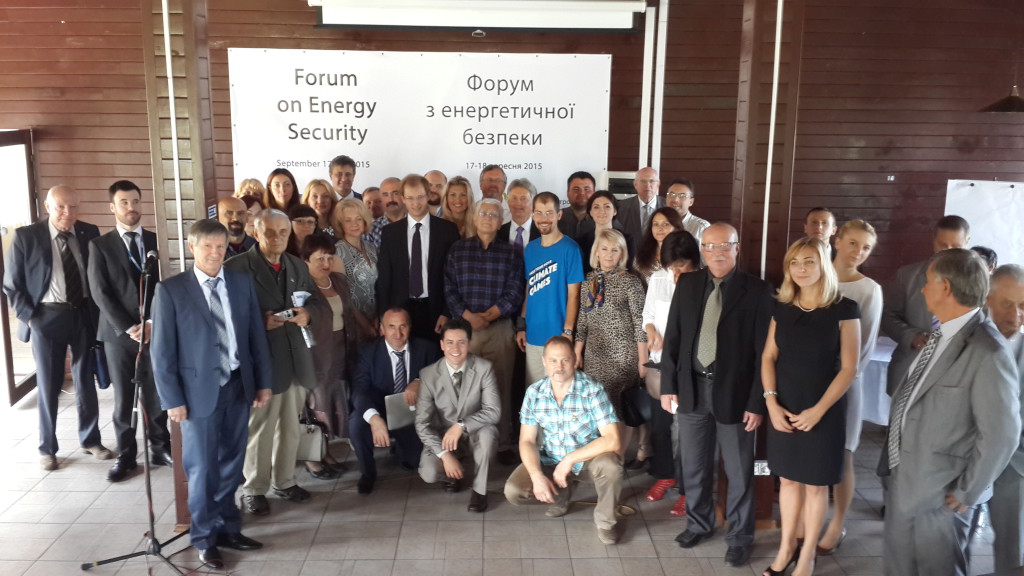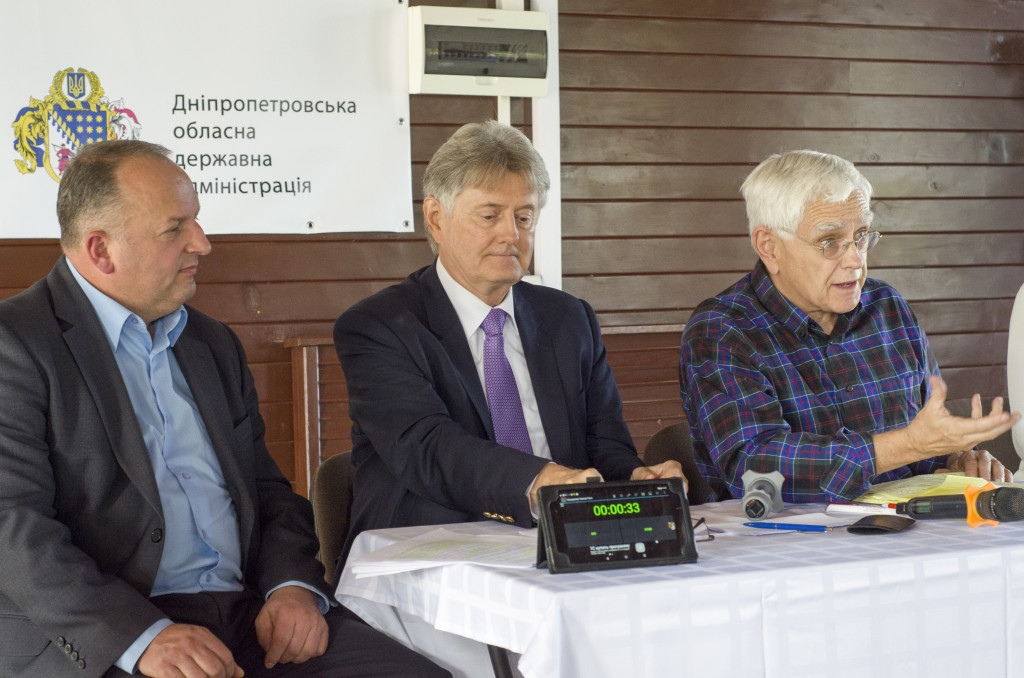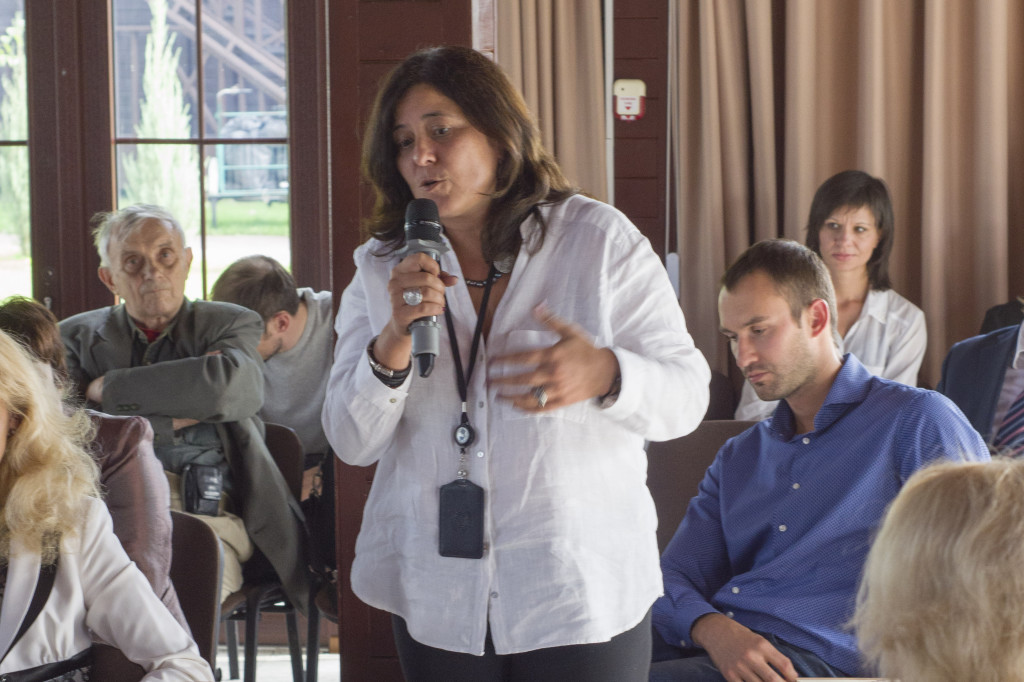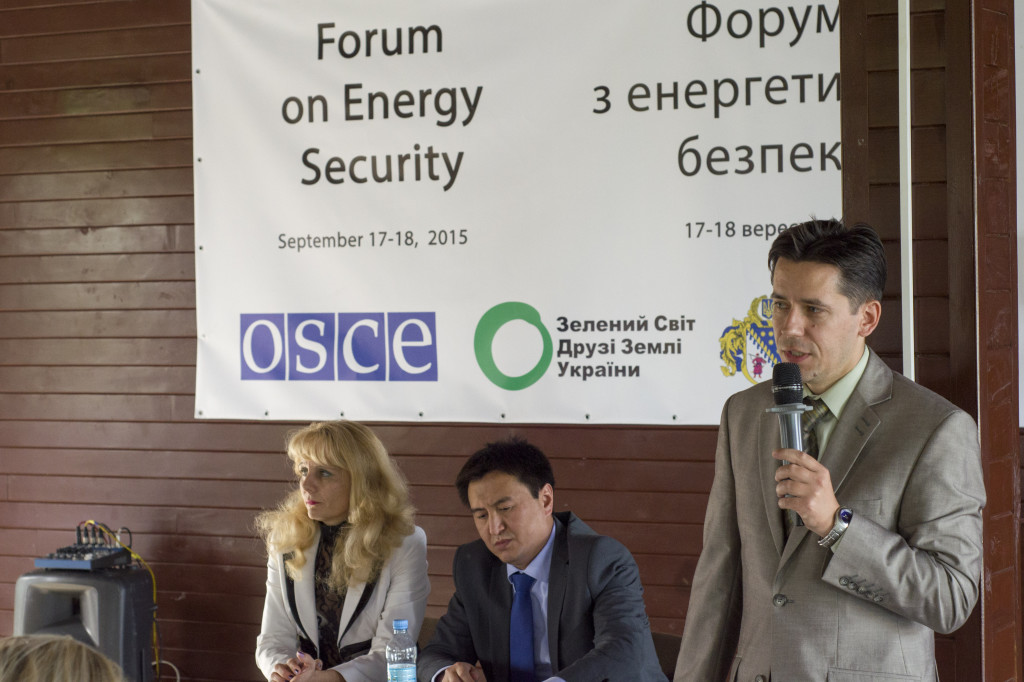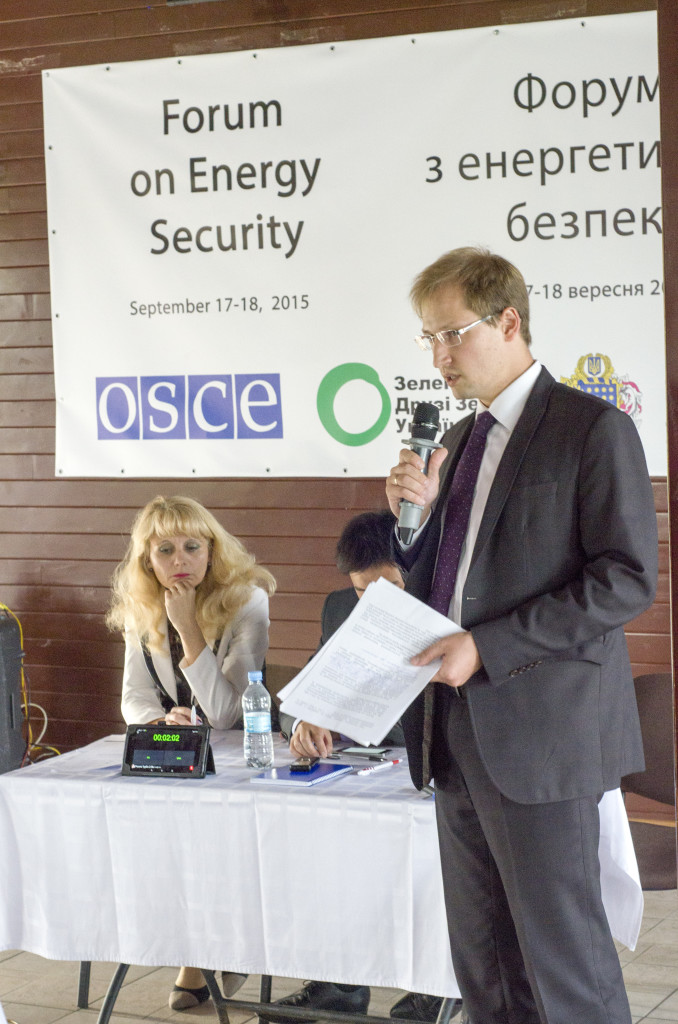Forum on Energy Security took place in Dnepropetrovsk on 17-18, September. It was organized by OSCE, Ukrainian Ecological Association Zelenyi Svit/ Friends of the Earth Ukraine and Dnipropetrovsk Regional State Administration.
From left to right: Ruslan Strilets’ – Director of the Department of Ecology and Natural Resources of Dnipropetrovsk Regional State Administration, Olexiy Angurets- director of the regional office of Zelenyi Svit/ Friends of the Earth Ukraine, Jennifer Betti – Deputy Head of SMM OSCE, J.A.Kazlas – Monitoring Officer at OSCE Special Monitoring Mission to Ukraine
Moderators hold a meeting in the form of a dialogue: the short speeches of the presenters were followed by debates on energy security problems and issues. Representatives of international organizations (OSCE, UNIDO, GIZ, UNO), local authority, non-governmental and ecological organizations (Zelenyi Svit/ Friends of the Earth Ukraine, Voice of Nature, Community Cooperation, International Dnipro Fund (Nikopol branch)and others), business (DFEC, Promconversion, BDO), university lecturers (DNU after O.Gonchar, Civil Engineering Academy, National University of Mines), bloggers and activists. More than 70 participants took part in the meeting.
During the “first dialog”, Ighor Kyrylchuk, the representative of the UNIDO, focused his attention on the world crisis and the ways of overcoming it: to the program of consumption reduction of the energy dependent countries, businessmen, industry representatives and civil society representatives should be attracted. The engagement to the switch of the energy effective technologies such as “green tariff”, allowances, bonuses, certificates is one of the important tools towards this direction. Oleg Savitskyi, the member of the National Ecological Centre of Ukraine, pointed out that the present crisis has political, economic and ecological roots, and the reason of it is a limited access to the fossil resources. Climate changes due to the use of coal and that can endanger Ukrainian agriculture, its infrastructure elements.
During the second “dialog” Mariya Storchilo, the member of National Ecological Centre of Ukraine, tried to identify parallels between the use of fossil fuels and climate change on the planet. Grygoriy Shmatkov, Professor, the Head of Committee of Science and Technology at the Department of Ecology and Natural Resources of DRSA, insisted on transforming Ukraine from the raw material increase of GDP to the high-technology production, which does not require much resources. In this case the rise in economy doesn’t correlate with the rise of contaminations.
Bruce Rich, an expert in ecology, a well-known lawyer from Washington was invited for the “third dialog”. He brought to Ukraine the latest data regarding international coal-mining companies. A lot of these companies are going bankrupt on the American market. International banks have postponed financing this direction, many of them are withdrawing their investments from these fields. SAR, that has much in common with Ukrainian energy system, is going to reduce significantly the percentage of coal plants in energy generation from 84% to 30% up to 2030. Statistics from the USA completely ruins the manipulative social employment aspect: 80,000 people are involved in the coal-mining sphere while alternative energy sector engages more than 220,000 employees.
From left to right: Yuriy Ostryanyn – DFEC, J.A.Kazlas – Monitoring Officer at OSCE Special Monitoring Mission to Ukraine, Bruce Rich – expert-ecologist, lawyer.
The “old school” representatives Yuryi Ostryanyn (DFEC) and Professors of National University of Mines opposed the debates. They expressed their point of view insisting that the process of coal-mining is going to be under the way for more than 30 years as a lot of coal plants and working places base on it.
This dialogue resulted in the longest debates. Director of the Department of Ecology and Natural Resources of Dnipropetrovsk Regional State Administration Ruslan Strylets’ recommended the DFEC representatives that they should launch alternative energy as one of the basic approaches of the company policy. That will help them be ready for the new market and have European strategy of development.
Mar’yana Katazarova, the Head of the UN Regional Office on Human Rights, asked the DFEC representatives about the shootings around the mines, salaries and pensions payments, monitoring of coal-mining and energy-generating emissions. The news about prolonging the terms of lifespan of the Chernobyl nuclear power plant unit on the territory of Ukraine raise worries.
Mar’yana Katazarova – the Head of the UN Regional Office on Human Rights.
Sustainable development was the issue for discussion in the fourth “dialogue”. Olexiy Angurets, director of the regional office of Zelenyi Svit/ Friends of the Earth Ukraine stressed that Ukraine is facing an important choice. As Ukraine is a resources-dependent country, the question of its sovereignty will rise in case the sustainability conception is not going to be implemented now. According to Olexiy, the present crisis is a solid reason to reconsider the economy on the whole and estimate the real costs of productions which do not include entire cycle-process: from raw material extraction and wastes utilization to restoration of negative impact on people health and nature.
From left to right: Irina Bryzshan’ – German Society of International Cooperation, Almaz Usenov –OSCE, Olexiy Angurets, Member of the Executive Committee, Friends of the Earth, Europe
Director of the Department of Ecology and Natural Resources of Dnipropetrovsk Regional State Administration Ruslan Strylets’ was the next speaker. He pointed out two main issues for switching to sustainable development:
- Reforms implementation. Its no point copying the foreign models for solving their own problems, its worth putting into life our own reforms, targeting at solving Ukrainian problems.
- Development of active society, which will initiate and control the changes planned. Apart from it, the representative of the administration highlighted the fact that all changes in the economy should be consistent and foreseen: its dangerous to close down the enterprises as they function both as social-and-tax-payers and economy-and-infrastructure providers.
The main objective should be the switch to ecologically safe activity.
Irina Brizshan’, German Society of International Cooperation, told about the engagement of medium and big enterprises into energy efficient technologies, about levels of influence on them and also about the current programs in Ukraine.
Vyctor Gasso, Associate Professor, ecotoxicologist from DNU after O. Gonchar, stressed his attention on the fact that the transformation to sustainability process should have its markers and purpose, that will ensure the implementation of the program. Conception will be successful if a happy and healthy Person will live into the stable ecosystems.
The second day of the event started from the “dialogue 5”: “Alternative energy: The cutting-edge technological inventions.” Pavlo Khazan, the coordinator of the campaign on sustainable energy of Zelenyi Svit/ Friends of the Earth Ukraine reviewed the range of modern ecological ways of receiving energy. The speaker emphasized that the country should minimize consuming and use of nuclear power, natural gas, coal plants. The problem lies not only into ecological aspect but also in the factor that these sources have turned into the levers of political influence, they have become the weapons in hybrid war.
Sergyi Kamynskyi, the Manager of the project “PromConversion” told about the use of alternative energy in practice. He is a supervisor of many projects of energy efficiency, heads one of the branches of Mini Academy of Science. The following inventions were presented:
- organic low-cost solar batteries
- frontal paint, functioning as energy saver
- “Tesla tower” which receives energy from ionosphere etc.
The speaker drew attention to the fact that energy-dependent enterprises and people are resistant to populist statements of government and big political players blackmailing.
A few remarks concerning the lack of project information were expressed by the participants. It would be desirable also to see their prices and economic grounds. Such information would significantly increase the speed of implementation of those inventions.
Olena Zarutska, the Head of the Banking Control Department at the National Bank of Ukraine, was invited for the “sixth dialogue “. She presented statistics, that reflect tremendous fall at the banking sector, tendencies to reduce portfolio of credits, banks closings down, absence of credit costs.
Yuryi Shevtsov’s, the specialist on credits from Oschadbank speech was a good contribution to the report. He assumes that the declared governmental initiatives on heat insulation of civil buildings and switch to the alternative heating work poor. Its practically impossible to receive a 30% reimbursement on heat insulation and boiler as there is no money for that in budget. And Organisation of appartments co-owners (OSBB) loan on this program has amounted only to HRN 5,000 for one consumer.
Bruce Rich finished the issue of the financing transformation to sustainable energy. He prepared report, which confirms, that Ukraine has already received billions of dollars on projects of integration in European energy system and switch to the alternative energy from international financial institutions. Many commercial banks of Ukraine are given these money with low interest rate – this way is a common way of giving money all over the world. This data is available on the official sites of the banks. The participants were surprised at this information and asked a few questions:
- What the interest rate for this type of loan is in Ukraine
- If this finance is used on purpose
- If this is available for medium business
- How the efficiency of use is controlled
Bruce Rich mentioned that all the answers for these questions can be sorted out by every participant of the forum as everyone is a member of a powerful civil society.
Olexyi Angurets summed up the outcomes of the forum. The array of the main problems was identified:
- Excessive energy dependence of Ukraine from imported energy products.
- Low efficiency of fossil fuels sources use by the state, business and people.
- Low share of alternative energy among other sources.
- Political, economic and military vulnerability of the state due to the energy products deficit.
- Incomplete assessment of the harm from coal and nuclear energy: the process of fuel extraction, wastes utilization, occurrence recultivation, harm to nature and population restoration are not being concerned.
- Weak current law system on the energy efficiency issues.
Following the results of the meeting, participants agreed:
- Make up a platform for coordination between civil society, science, business and authority regarding energy efficiency implementation.
- Identify the problems on each weak points of the process of putting into life energy efficiency.
- Devise a program to solve each problem.
- Engage the experts for solving the problems on each direction.
- Outline the markers to signal the success of the platform functioning.
The forum participants sincerely hope for the positive results of the platform functioning and believe that Ukraine will become independent, developed and modern country.
